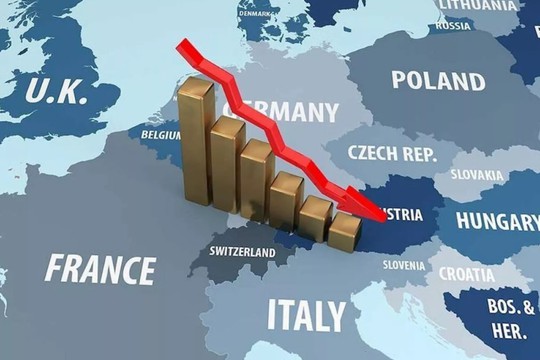Pic.: it.reseauinternational.net
Britain's Chancellor of the Exchequer Rachel Reeves will unveil a budget that she admits will be dominated by an assault on wallets, with speculation about increases in income tax and new property taxes.
Many European nations, including Germany and France, are facing similar financial struggles, with high social welfare costs and unsustainable systems, and leaders are struggling to persuade voters to accept cuts, Bloombrg writes.
Britain's public finances are in a deep hole, with interest on debt consuming a large portion of state revenue, and many people are economically inactive, being paid by the state not to work, which alarms those who ponder the country's economic future.
As the British people approach the Christmas season, many of us anticipate less the pleasure of eating turkey than the nigh-certain pain of having our own feathers plucked. On Nov. 26, Labour Chancellor of the Exchequer Rachel Reeves will unveil a budget that she admits will be dominated by an assault on our wallets. There is speculation about prospective increases in income tax, big hits on the better-off, new property taxes and even a possible levy on capital assets.
This is made necessary by a black hole in Britain’s public finances so deep that The Economist recently asserted that the government is going bust. Interest on debt consumes a larger portion of state revenue than does defense, infrastructure or education. More than half of British people take more cash from the state than they pay in taxes.
The social programs of all the major European nations are at risk
Britain is far from alone in this predicament. In August, German Chancellor Friedrich Merz displayed the courage to acknowledge that his country’s social welfare costs have become unsustainable: “We simply can no longer afford the system we have today,” he said. “This will mean painful decisions. This will mean cuts.”
France is the highest social spender in Europe, but its citizens demonstrate, and indeed riot, in protest at President Emmanuel Macron’s attempts to raise the national retirement age from the absurdly low 62 years to 64. Prime Minister Sebastien Lecornu, facing diehard opposition from both the hard left and extreme right, now proposes to suspend implementation of this modest measure until after the next presidential election, due in 2027.
A year ago, European Central Bank President Christine Lagarde warned that the social programs of all the major European nations are at risk. Matters have got worse since she spoke, yet there is no sign that weak political leaders can persuade voters of an imperative to make do with less.
Across large swaths of electorates, there is a sense of grievance, a belief that people are being penalized for crimes they have not committed. Far-right parties exploit this, accusing immigrants of diverting resources which rightfully belong to native citizens.
Meanwhile, the German car industry, which for decades drove the nation’s prosperity, is teetering dangerously amid high labor costs and expensive energy, the latter largely the consequence of former Chancellor Angela Merkel’s disastrous decisions to renounce nuclear power and to bet the ranch on Russian oil and gas. European business pays an average double American industry’s prices for energy. Most British companies pay four times US prices, thanks to extravagant green policies.
Italy is the only large European nation that appears to be bucking the trend towards government paralysis. Prime Minister Giorgia Meloni, once deemed a far-right firebrand, has just completed her third year in office, having achieved a notable degree of stability. Italy’s borrowing costs have fallen, unemployment is down and tax revenue is up. The country’s fiscal deficit has halved.
Merz had it right, when he told Germans their economic output can no longer sustain their social spending, and the same goes for much of the rest of Europe. The challenge for our leaders is to tell such truths to voters unwilling to hear them.
A class war is back
As for Britain, many people are deeply depressed by the prospect of tax raises, not only because they will hurt our pockets and — worse — the prospects of our children and grandchildren, because much of the money raised will be swallowed up by either debt interest or reckless welfare payments.
A staggering proportion of our people — almost 9.4 million — are economically inactive, in addition to 1.6 million unemployed, in all one-fifth of the working age population. They are being paid by the state not to work. To be sure, some are physically handicapped, or caring for disabled or elderly family members.
But many of the younger do-nothings are simply opting out of what we would call a life, a career, as members of society who pay their way. Some allegedly suffer from anxieties making them incapable of daily labor — more than 800,00 more people are out of work than in 2019 due to these alleged health problems.
The apparent inability of any British government to address these crazy numbers, to reduce state benefits for idleness, to improve stagnant national productivity, alarms everyone who ponders our economic future. Successive Conservative prime ministers did nothing effective between 2010 and 2024. Labour is in a worse place. Prime Minister Keir Starmer’s MPs in parliament vote down all welfare cuts, or kill them by threatening to do so.
Many of these legislators, left-wingers who appear innumerate, demand that the government should keep shaking the money tree to support the less well-off by levying punitive imposts on those whom they dub “the rich,” including much of Britain’s middle class. To an extent that astonishes those of us who believed that the Labour Party forever abandoned its heavy socialist past when Tony Blair became prime minister back in 1997, class war is back.
read more in our Telegram-channel https://t.me/The_International_Affairs

 11:45 10.11.2025 •
11:45 10.11.2025 •























